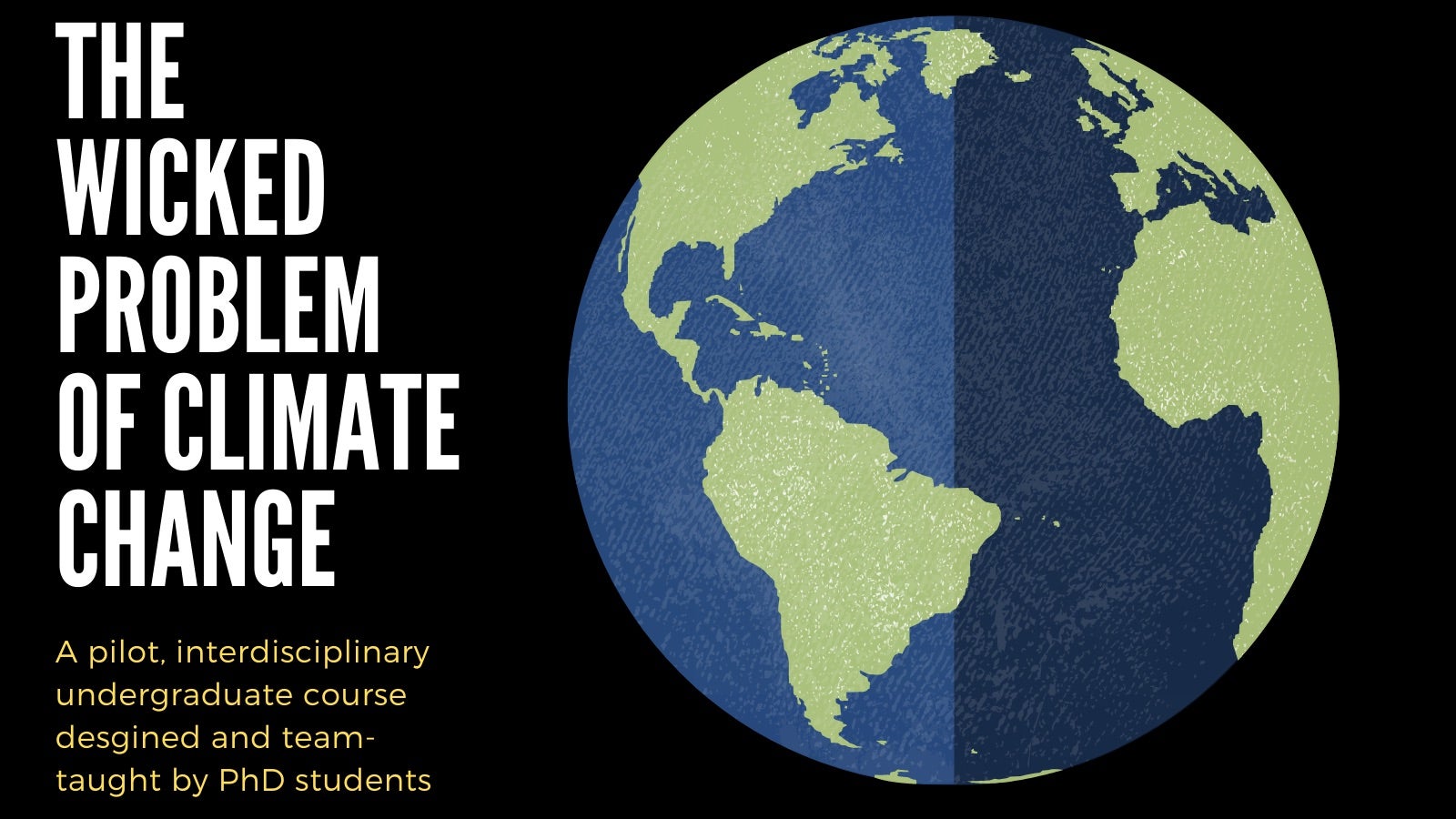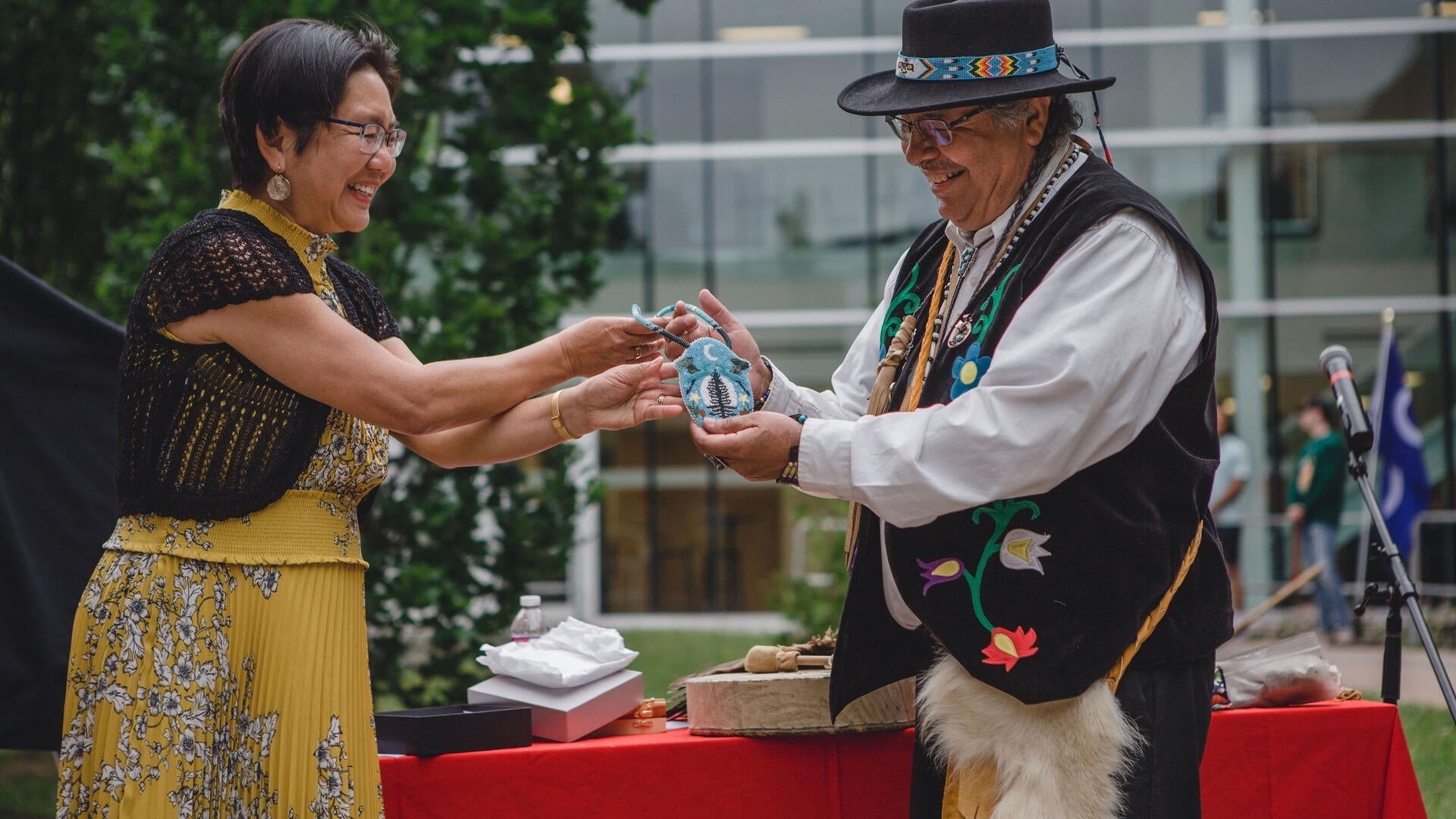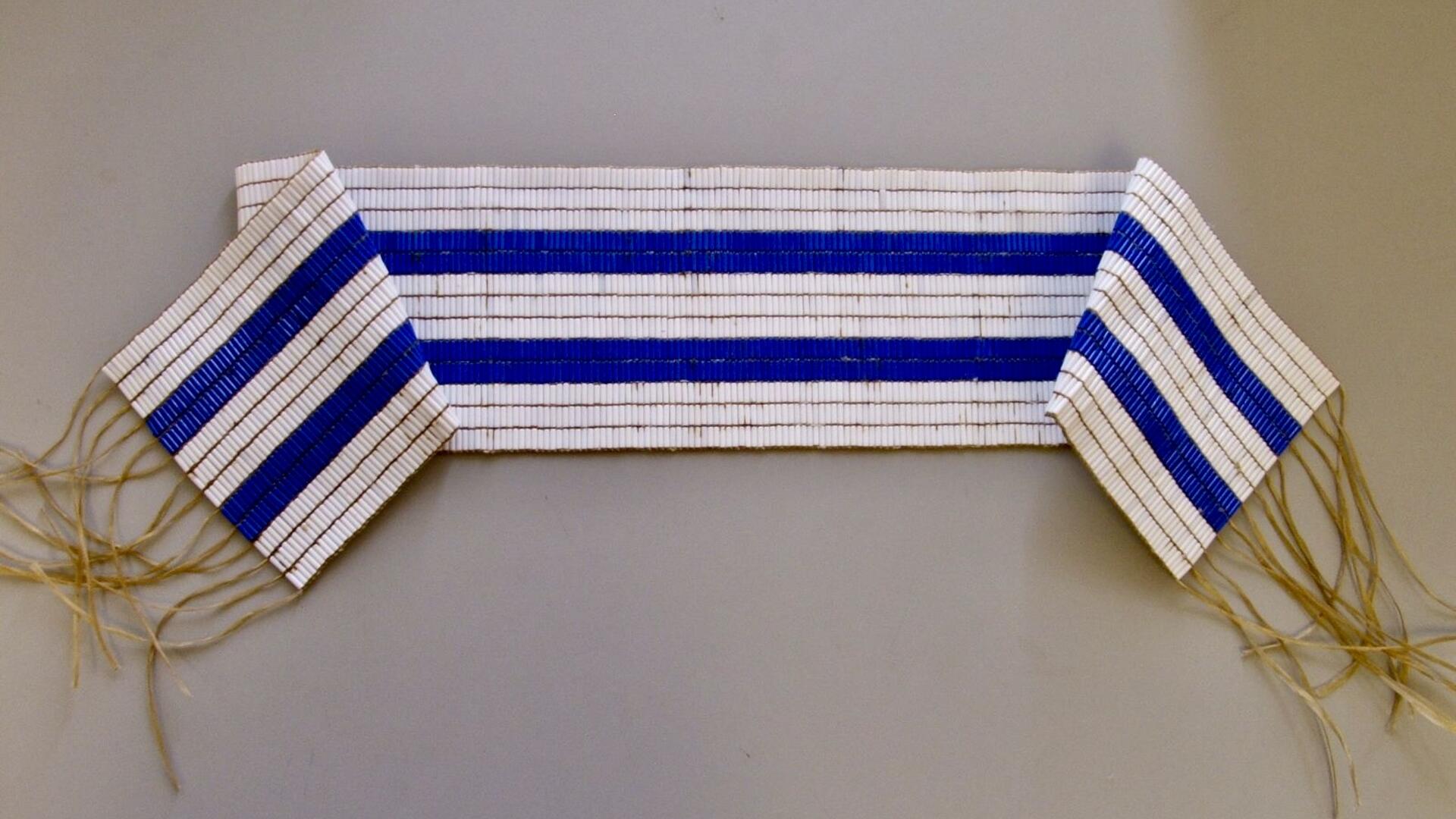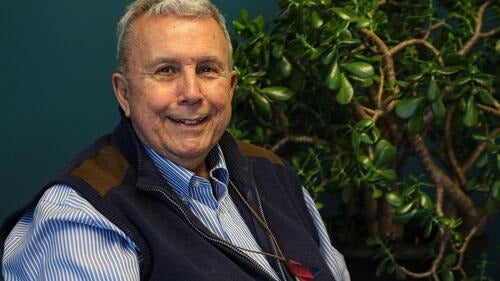- Celebration, reflection and the summer ahead
- New course alert: the Wicked Problem of Climate Change
- Planting the seeds of reconciliation
- Q and A with the experts: Reclaiming Indigenous histories
- Engineering's Elder in Residence offers courses and counselling grounded in his Indigenous background
- What's open and closed this weekend
Editor:
Brandon Sweet
University Communications
bulletin@uwaterloo.ca
Celebration, reflection and the summer ahead
A message from Vivek Goel.
Last week I shared a blog post with the community reflecting on the enormous success of our week of Convocation. I wanted to take a moment, though, to write to you all directly to reflect on the year so far – the end of my first year here at Waterloo – and what lies ahead.
This June has been filled with wonderful opportunities to celebrate our community. At the heart of our celebrations was the largest Convocation we have ever seen. From June 11 to June 18, we celebrated alongside a total of 8,320 graduates and 18,522 guests in person here in Waterloo.
We owe an enormous thank you to the people who made it possible to welcome back graduands and alumni from 2020, 2021 and 2022. More than 350 employees from across our campus communities came together with 200 student ushers, and another 275 volunteers to make this Convocation truly a once-in-a-lifetime event.
For so many people, Convocation was amongst the first opportunities we have had to connect in person with our friends and colleagues. The events really brought the campus alive and I know our students appreciate the return to in person experiences. The connections and communities that we develop on our campuses and beyond are the foundation of a positive student experience and what makes the University of Waterloo so special.
This month we have also celebrated Pride and National Indigenous History month. I am so pleased that our students from the GLOW centre were able to attend Toronto’s Pride March on Sunday. And if you haven’t had an opportunity to attend one of the many Indigenous events on campus this month, I encourage you to attend Bmaadziwin: An Indigenous Perspective of Life later today to learn from Elder Myeengun Henry.
As we reach the Canada Day long weekend, I hope the day away from the University gives you an opportunity to rest and relax. No matter how you mark the day, I encourage you to celebrate how diverse communities and individuals add richness and vibrancy to our campuses and Canadian society. We can also reflect on how we can do better to break down barriers for marginalized voices, and work toward Truth and Reconciliation.
As I approach the end of my first year at Waterloo, I’m reflecting on what I have heard in the many consultations and conversations I have had as part of the Waterloo at 100 project. I have heard your motivation to think about the longer-term future for Waterloo, your openness to working in new ways and your pride in our institution. I’m grateful for your input and look forward to sharing more with you in the Fall. Until then, you can continue to share your perspectives and stay up to date with the project online.
I do hope that over the next couple of months you will make some time for you, your friends, family and loved ones. Thank you for everything you do for the University of Waterloo.
Have a great summer. I look forward to seeing you all on campus this Fall.
New course alert: the Wicked Problem of Climate Change

A message from GSPA.
In winter 2023 a pilot, interdisciplinary undergraduate course will be taught by a group of doctoral candidates from the University of Waterloo. It will focus on the Wicked Problem of Climate Change and will provide undergraduate students with a classroom experience where the academic content spans disciplinary boundaries.
The team will spend the fall 2022 term designing the course by working with each other and with mentors in the Beta Teaching Innovation Incubator (up to 10 hours a week, equivalent to a TAship).
PhD candidates researching in the area of climate change are invited to apply for this pilot. The intention is to select up to six doctoral student researchers, with diverse representation from across the faculties. For more information, visit The Wicked Problem of Climate Change course web page. The deadline to apply is July 12.
Planting the seeds of reconciliation

By Eugenia Xenos Anderson. This article was originally featured on Waterloo News.
Even before the commitment was made on paper and then solidified in ceremony, talk of Indigenous reconciliation had been taking place in the University of Waterloo’s Faculty of Health. However, it took the hire of an Indigenous Knowledge Keeper to give shape to a process that is sometimes not well understood and often difficult to begin.
That Indigenous Knowledge Keeper is Elder Myeengun Henry, formerly Chief of the Chippewas of the Thames First Nation and Indigenous leader at Conestoga College. His voice is soothing but forceful, and he looks like a man who has found his calling. Part grandfather, part sage, part friendly neighbour, he is a healer who came to Waterloo at just the right time.
Elder Henry is at a stage in his life where he wants to share his knowledge, experiences, language and culture. He wants to offset the damage of more than one hundred years when Indigenous culture, identity and languages were stifled, prohibited and criminalized. He tirelessly spreads the word through learning circles, ceremonies and even attending every single one of the 20 convocation ceremonies this spring. He does it patiently and cheerfully, but also pointedly when necessary.
“We had to have a starting point,” said Elder Henry at the Faculty of Health’s inaugural Commitment Ceremony this week. In this case, the starting point was the inclusion of a signature commitment to create “an environment that invites and respects Indigenous ways of knowing” in the Faculty’s latest strategic plan, made formal by the ceremony.
“The vision was there, so today we make that full commitment by planting a cedar tree as a point of celebration,” he said. He and Dean Lili Liu also exchanged gifts: a sacred eagle feather for the Faculty, and a one-of-a-kind beaded medallion for Elder Henry. They also unveiled a Wampum Belt that will hang in the Health Expansion building.
“I am overwhelmed by the support and love I’ve felt since I came to help build this up,” Henry says. “I know there is honour and respect of Indigenous people in this Faculty. We’ll find our struggles now and then and have differences of opinion, but I think overall, our commitment is here and is strong.
The feeling is mutual. Dean Lili Liu is grateful for the leadership and counsel Elder Henry is providing. “Not only has Elder Henry shared deep knowledge and wonderful ideas for how to help make our spaces and actions more inviting and welcoming, but he has quickly become a part of our Faculty family.”
While the Faculty’s reconciliation efforts have started with events such as a Red Dress Day commemoration and the Commitment Ceremony, they are also creating spaces that can be used by Indigenous students and others, installing Indigenous artwork to make students feel comfortable and accepted, and including Indigenous knowledge into the curriculum to make a difference in how we practice and deliver health programs and services.
“Give students a place to congregate, celebrate, smudge and be proud to be an Indigenous student in the Faculty of Health,” Elder Henry says. “I see a vision coming true, a formal commitment to making this come true. It will be longer than the life of a strategic plan.”
Of course, there is good reason Elder Henry is motivated to teach about Indigenous history and culture: “We did ceremonies on this land. We walked this land and we fed our families on this land. It’s important for Indigenous people to know that we are still here.”
You can hear more from Elder Henry on the Beyond the Bulletin podcast where he shares his goals and motivation as he approaches his work at Waterloo.
Q and A with the experts: Reclaiming Indigenous histories

This article was originally featured on Waterloo News.
During National Indigenous History Month and as we celebrate National Indigenous Peoples Day on June 21, University of Waterloo historian and anthropologist Talena Atfield answers questions about the recovery and regeneration of Indigenous artifacts, practices and knowledges. Professor Atfield is a member of the Kanien'kehá:ka Nation of the Six Nations of the Grand River.
What do people need to understand about the repatriation and preservation of Indigenous histories and artifacts?
I believe that people should learn how and why Indigenous museum and archival collections were made, the impacts these practices continue to have on communities, and why repatriation can be an important tool for conciliation and healing. Most collections were built on agendas of extermination, land theft, the erasure of Indigenous presence, and literally, on Indigenous physical bodies. The perpetuation of anti-Indigenous sentiments, such as a hierarchical scale of human evolution, in which European settlers were at the top and Indigenous Peoples worldwide occupied various stages below, enabled land theft and resource extraction. This was further supported through pseudoscientific practices that boasted the ability to determine levels of intelligence and moral character through skeletal morphologies, which were used to argue Indigenous peoples had not reached the pinnacle of human evolution.
These ideas were combined with the false notion of the “vanishing race,” which posited that “authentic” or “real” Indigenous people only existed in a “pure” and “uncontaminated” past. Contact with European colonizers resulted in outside influences that doomed “real” Indigenous Peoples to extinction. This, in turn, enabled the widescale extraction of Indigenous material cultures and promoted the erasure of Indigenous presence and contributions to what is now Canada. This extraction en masse saw the removal of items essential to the continuation of some spiritual and ceremonial practices. Many Indigenous individuals and communities are still trying to recover and regenerate knowledges and practices that were affected by these histories.
How is intangible Indigenous knowledges preserved?
Hodinohso:ni people have continued to preserve intangible knowledges through stories, oral histories, and mnemonic devices such as wampum. Stories are a rich source of information, and the act of storytelling and listening to stories has played an integral role in teaching generations of Hodinohso:ni people what it means to be Hodinohso:ni. Intangible knowledges are also preserved in language, Hodinohso:ni languages are rich with information detailing how ideas or objects fit into Hodinohso:ni ethos; much of this information becomes lost in translation, which is why it is so important to support and promote Indigenous language initiatives.
What is the most pressing work yet to be done to preserve and share Indigenous histories?
Making collections accessible to the communities from which they originated would be very impactful. Currently, there are archives full of audio recordings, photographs, and detailed field notes, as well as storage rooms full of material culture, much of which has not been available to the community since it was taken over 100 years ago. Many communities and individuals don’t know how or where to find information related to these collections or how to access them. Items are located all over the world, everywhere but where they are needed most. The most pressing work, in my opinion, is ensuring that institutions have adequate funds and staff to carry out digitization and dissemination of this archival information, as well as decentralizing of the collections back to home communities where possible, so information that has been extracted from communities can be regenerated into practice.
How can people support repatriation, preservation, and knowledge sharing?
I recommend people learn Indigenous histories, on the land they occupy, at the very least. There is incredible diversity within and among Indigenous Nations in what is now Canada. Until recently, Indigenous perspectives and narratives have been entirely absent from the Canadian curriculum. This has played a large role in perpetuating violence against Indigenous peoples. I recommend people attend appropriate cultural events, learn the history of the treaties — or lack thereof — in the areas they live and visit, take courses, and read Indigenous-authored books. There are so many free digital learning opportunities available that uplift Indigenous Peoples' voices from across Canada that people could engage.
Engineering's Elder in Residence offers courses and counselling grounded in his Indigenous background

By Carol Truemner. This is an exceprt of an article originally featured on Waterloo News.
Passionate about sharing his Indigenous heritage, an adjunct architecture professor named a new course after the ceremony his ancestors have used for thousands of years to welcome visitors to their homeland — At the Woods Edge.
This semester, William Woodworth, also known as Elder Bill, started teaching the course focused on the relationships between Indigenous peoples and settlers from the 16th century to today, and how those associations have affected both engineering and architecture.
Woodworth’s offering draws, in part, on his background as a member of the Lower Mohawk Kanien'kehá:ka Nation of Six Nations of the Grand River in the Bear Clan.
In the mid-1990s, he had the opportunity to apprentice with Cayuga Chief Jacob Ezra Thomas Deyohonwedah of the Six Nations of the Grand River Territory where he was immersed in the Haudenosaunee practices and culture.
Born in the United States, Woodworth completed an architecture degree at the University of Michigan, Ann Arbor.
Building on his architectural education, he launched William Woodworth Architect in Toronto in 1980 and practiced as a member of the Ontario Association of Architects, and the Royal Architectural Institute of Canada.
In 1993, he took a sabbatical to teach at the Lawrence Technological University outside of Detroit. From there, he began doctoral studies at the California Institute of Integral Studies in the program Recovery of the Indigenous mind and graduated in 2001.
Read the rest of the article on Waterloo News.
What's open and closed this weekend
The University will be closed on Friday, July 1 for Canada Day. Many, if not most, campus operations will be closed, or have modified operating hours, during the holiday long weekend.
- The Student Life Centre, including the Turnkey Desk, is open all day. Turnkey at DC is closed.
- University Library locations are open with limited hours. Dana Porter and Davis Centre libraries are open 12 noon - 6:00 p.m. Chat hours are 12 noon - 4:00 p.m., and Email us hours are 12 noon - 6:00 p.m.
- All W Store, W Store Essentials and W Print locations will be closed for the long weekend. All locations will re-open for regular business hours starting Monday, July 4.
- Most Food Services locations are closed, with the exception of The Market at CMH, which will be open from Friday, July 1 to Sunday, July 3 from 8:30 a.m. to 10:30 p.m.
- Both PAC and CIF are closed on the Friday. Regular operating hours return Saturday, July 2.
To all those who are celebrating, have a Happy Canada Day, and enjoy the extended long weekend however you can. The Daily Bulletin will return on Monday, July 4.
Link of the day
When and Where to get support
Students can visit the Student Success Office online for supports including academic development, international student resources, immigration consulting, leadership development, exchange and study abroad, and opportunities to get involved.
Instructors looking for targeted support for developing online components for blended learning courses, transitioning remote to fully online courses, revising current online courses, and more please visit Agile Development | Centre for Extended Learning | University of Waterloo (uwaterloo.ca).
Instructors can visit the Keep Learning website to get support on adapting their teaching and learning plans for an online environment.
Course templates are available within your course in LEARN to help you build and edit your content and assignment pages quickly.
The following workshops, webinars, and events are offered by the KL team (CTE, CEL, ITMS, LIB):
-
Scholarship of Teaching and Learning (SoTL) Methods – self-directed, continuous self-enrollment course in LEARN.
-
Independent Blended Course Design (iBlend) - self-directed, continuous self-enrollment course in LEARN.
-
Copyright Overview for Waterloo Instructors and Staff - self-directed, continuous self-enrollment course in LEARN.
-
Independent Remote Course Design Essentials (iReCoDE) - self-directed, continuous self-enrollment course in LEARN.
-
Supporting Student Mental Health (for Instructors) – self-directed, continuous self-enrollment course in LEARN.
Supports are available for employees returning to campus. Visit IST’s Hybrid Work and Technology guidelines and workplace protocols to assist with the transition.
The Writing and Communication Centre has in-person and virtual services to support grad and undergrad students, postdocs and faculty with any writing or communication project. Services include one-to-one appointments, drop-ins at Dana Porter Library, online workshops, writing groups, English conversation practice, and custom in-class workshops.
Co-op students can get help finding a job and find supports to successfully work remotely, develop new skills, access wellness and career information, and contact a co-op or career advisor.
The Centre for Career Action (CCA) has services and programs to support undergrads, grad students, postdocs, alumni, and employees in figuring out what they value, what they’re good at, and how to access meaningful work, co-op, volunteer, or graduate/professional school opportunities. Questions about CCA's services? Live chat, call 519-888-4047, or stop by our front desk in the Tatham Centre 8:30 a.m. to 4:30 p.m., Monday to Friday.
Drop-in to Warrior Virtual Study Halls on Wednesdays from 5:30 p.m. to 7:00 p.m. Come together in this virtual space to set goals and work independently or in groups each week.
Renison's English Language Institute continues to offer virtual events and workshops to help students practice their English language skills.
If you feel overwhelmed or anxious and need to talk to somebody, please contact the University’s Campus Wellness services, either Health Services or Counselling Services. You can also contact the University's Centre for Mental Health Research and Treatment. Good2Talk is a post-secondary student helpline available to all students.
The Library is open with expanded hours for access to book stacks, drop-in individual study space, bookable group study rooms, drop-in access to computers and printers, book pick-up services and IST Help Desk support. Librarian consultations, Special Collections & Archives and the Geospatial Centre are available by appointment. Full details on current services and hours are available on the Library’s COVID-19 Update webpage.
The Faculty Association of the University of Waterloo (FAUW) continues to advocate for its members. Check out the FAUW blog for more information.
The University of Waterloo Staff Association (UWSA) continues to advocate for its members. Check out the UWSA blog for more information.
The Sexual Violence Prevention and Response Office (SVPRO) supports all members of the University of Waterloo campus community who have experienced, or been impacted, by sexual violence. This includes all students, staff, faculty and visitors on the main campus, the satellite campuses, and at the affiliated and federated Waterloo Institutes and Colleges. For support, email: svpro@uwaterloo.ca or visit the SVPRO website.
The Office of Indigenous Relations is a central hub that provides guidance, support, and resources to all Indigenous and non-Indigenous campus community members and oversees the University's Indigenization strategy.
The Waterloo Indigenous Student Centre, based at St. Paul’s University College, provides support and resources for Indigenous students, and educational outreach programs for the broader community, including lectures, and events.
WUSA supports for students:
Peer support - MATES, Glow Centre, RAISE, Women’s Centre - Visit https://wusa.ca/services/wusa-peer-support to book an appointment either in person or online for the Fall term.
Food Support Service food hampers are currently available from the Turnkey Desk 24/7 in the Student Life Centre. Drop off locations are also open again in SLC, DC, DP, SCH and all residences.
Co-op Connection all available online. Check https://wusa.ca for more details.
Centre for Academic Policy Support - CAPS is here to assist Waterloo undergraduates throughout their experience in navigating academic policy in the instances of filing petitions, grievances and appeals. Please contact them at caps@wusa.ca. More information is available.
WUSA Student Legal Protection Program - Seeking legal counsel can be intimidating, especially if it’s your first time facing a legal issue. The legal assistance helpline provides quick access to legal advice in any area of law, including criminal. Just call 1-833-202-4571.
Empower Me is a confidential mental health and wellness service that connects students with qualified counsellors 24/7. They can be reached at 1-833-628-5589.
GSA-UW supports for graduate students:
The Graduate Student Association (GSA-UW) supports students’ academic and social experience and promotes their well-being.
Advising and Support - The GSA advises graduate students experiencing challenges and can help with navigating university policies & filing a grievance, appeal, or petition.
Mental Health covered by the Health Plan - The GSA Health Plan now has an 80 per cent coverage rate (up to $800/year) for Mental Health Practitioners. Your plan includes coverage for psychologists, registered social workers, psychotherapists, and clinical counselors.
Dental Care - The GSA Dental Plan covers 60 to 70 per cent of your dental costs and by visiting dental professionals who are members of the Studentcare Networks, you can receive an additional 20 to 30 per cent coverage.
Student Legal Protection Program - Your GSA fees give you access to unlimited legal advice, accessible via a toll-free helpline: +1-833-202-4571. This advice covers topics including housing disputes, employment disputes, and disputes with an academic institution.
The Graduate House: Open Monday to Tuesday 11:30 a.m. to 7:00 p.m. and Wednesday to Friday 11:30 a.m. to 9:00 p.m. We’re open to all students, faculty, staff, and community members. The Graduate House is a community space run by the GSA-UW. We’re adding new items to the menu. Graduate students who paid their fees can get discounts and free coffee.
When and Where (but mostly when)
Warriors vs. Laurier Blood Donation Battle. Join our “Waterloo Warriors” team on the Blood.ca website or app. #ItsInYouToGive
Warriors Custom Apparel Program June 22 – July 13. Purchase customized team specific gear to get ready for the 2022-2023 season. Hoodies, Hats, Jerseys, T-shirts and more.
Warriors Youth Summer Day Camps, July 4 to September 2. Open to boys and girls age 5-18. Baseball, Basketball, Football, Hockey, Multi-Sport and Games & Volleyball. Register today.
Master of Taxation, Virtual Information Session Virtual Info Session Tuesday July 5 at 5:30 p.m. Learn more about the MTax advantage
Valuation of water quality in Canada: An overview of the upcoming policy needs and challenges, presented by Jean-Michel Larivière, Environment and Climate Change Canada. Part of the Water Institute's webinar series: The Value of Water in Canada. Wednesday, July 6, 12:00 p.m.
WaterTalk - Nature Water: A journal for all water-related research, presented by Fabio Pulizzi. Thursday, July 7, 10:00 a.m.